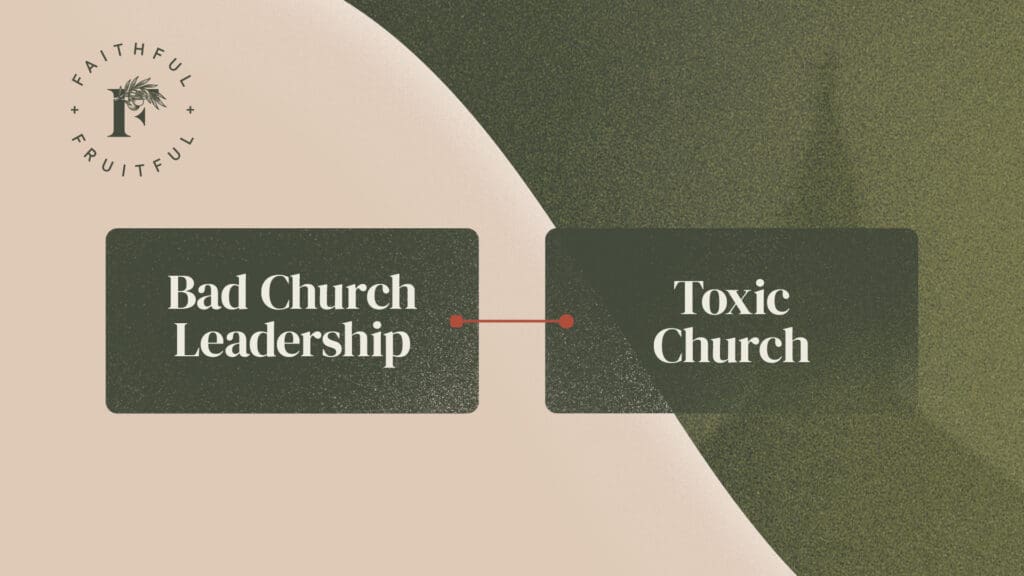“You couldn’t pay me $2 million per year to work at Mars Hill Church.”
Those were the exact words I said to my wife in the spring of 2012 after spending a week in Seattle at what was then one of the fastest-growing churches in the country.
I had a lot of respect for Mars Hill. I was in Seattle because I wanted to learn from them, especially related to a small group ministry that was helping people find greater freedom in Christ. My church plant was about three years old and, at the time, affiliated with the Acts29 network that Mars Hill was leading. I benefited tremendously from the numerous resources the church and Mark Driscoll were putting out, and I remain grateful for the many indirect ways the church invested in my leadership.
I wasn’t a hater.
But I could tell something wasn’t right.
As I interacted with some of the pastors and staff, it was clear to me that it was an unhealthy place to work — thus the comment to my wife.
Time would only tell how unhealthy the church actually was (and we’d have the chance to relive in the very popular podcast, The Rise and Fall of Mars Hill).
As we all know, Mars Hill was the cautionary tale of a prominent church with a toxic culture and a hypocritical and heavy-handed leader. Whether they are more common or just more widely known is up for debate — and it’s possible both are true. Either way, they are too common.
Whether you’re trying to identify signs of bad church leadership or guard against becoming a toxic leader or church staff, this article will provide some tangible indicators and vivid language to explore where toxicity may exist in a church’s culture.
Guiding Against Toxic Church Culture
I have no interest in piling on Driscoll, Mars Hill, or other fallen leaders.
But I have a tremendous interest in learning from their mistakes and creating something different — and better.
My ministry to serve pastors is called Faithful & Fruitful because that’s what I want to see.
We all know of small, impotent, irrelevant, dying churches that haven’t seen a convert in years but assure themselves that “At least we’re faithful.”
We also know of big, slick, over-relevant, growing churches that have compromised the confrontational message of the gospel but assure themselves that “Since people are coming, we must be doing something right.”
Some are faithful (they think), but not fruitful.
Others are fruitful (they think), but their lack of faithfulness makes you scratch your head.
Whether big or small, famous or unknown, new or established, I want to help as many leaders as possible become BOTH faithful and fruitful.
And to be faithful and fruitful, we have to be on guard against unhealthy, toxic leadership in every form it takes.
Toxic Churches Are Not Just Megachurches
Most of the high-profile stories of bad church leadership are from megachurches and pastors with big platforms. But the problem of toxic leadership isn’t just a large-church problem.

Churches of all sizes can develop extremely unhealthy cultures, and nobody is immune simply on the basis of church size.
For every egomaniac megachurch pastor who wants to build his brand, there’s an egomaniac small church pastor who finds his identity from needing to be needed.
For every megachurch pastor who neglects his family by writing books or hitting the speaking circuit, there’s a small church pastor who neglects his family by insisting that he needs to be at every church event.
For every megachurch pastor who rejects the authority of the board, there’s a small church pastor who never sets up that authority in the first place.
You get the point.
Unhealthy, toxic leaders exist in every size of church. And we have to put a stop to it.
Find the Seed That Will Grow into Toxicity
Some years ago, a very fast-growing church in my area was devastated by the revelation that the lead pastor was a serial adulterer. Numerous women started coming forward about the short and long affairs they had had with this pastor, and he was appropriately removed. This revelation reverberated not just through the specific church but through the whole Christian community around us.
I was together with a group of local pastors soon afterwards and we were discussing what happened. One of these brothers asked a question I’ll never forget:
“Is there anything in your life that is only in seed form now, but eventually could grow into a sin like that?”

He went on to make the point that nobody starts with an adulterous affair. Nobody starts with embezzling money. Nobody starts with being verbally abusive to staff.
All these things start smaller. Seeds of lust, entitlement, greed, and anger remain unchecked and allowed to grow — and eventually, the downfall is devastating.
It is similar to how Jesus talked about the ethics of his kingdom in the Sermon on the Mount. Sure, murder is bad, but what about anger? It’s the seed form of murder. Sure, adultery is bad, but what about lust? It’s the seed form of adultery.
In the same way, I want to explore the seed form of toxic church leadership so that pastors who are working to be healthy can catch dangerous dynamics while they’re still small and then chart a new course.
Signs of Bad Church Leadership
I’m not especially interested in debating the difference between toxic church leadership, bad church leadership, and unhealthy church leadership.
They are all damaging. They are all dishonoring to Christ. And the point is we want to avoid all of them.
To find the seeds of bad, unhealthy, toxic leadership, we have to consider the dynamics in play both in the leader and the church.
Toxic Church Leadership — in the Leader
Here are ten signs of the seeds of toxicity taking root in a pastor.
1. Superiority
At the top of the list of things that the Lord hates are “haughty eyes” (Prov 6:17), and pride is sure to draw God’s opposition (1 Pet 5:5). Jesus says that it’s possible to pray to God and yet remain condemned — if your prayer goes like this: “God, thank you that I am not like other men” (Luke 18:11).
When the Apostle Peter most directly addresses church leadership, the emphasis is on humility. He calls himself a “fellow elder” (1 Pet 5:1) though he could have called himself “an apostle” or “one of Jesus’ three favorite disciples.” And he says that any church shepherd is really still under the authority of the “chief Shepherd” (1 Pet 5:4).
A pastor who is subtly nurturing a seed of superiority might think of himself as a bit smarter, more theological, and more spiritual than others. Or he might think that, because he often knows more about a situation than others, his decision-making is impeccable. As a person who is often asked for guidance or counsel, he may begin to think that he is the smartest person in the room and actually does have all the answers. Over time, having preached hundreds of sermons or faced countless crazy situations, he may begin to trust in his own experience more than in the Spirit.
As the church grows and demands on his time increase, he will necessarily have to specialize and delegate less essential tasks — but superiority is creeping in when he starts to believe he’s now better than those who are doing what he was once so willing to do.
Let’s be clear: superiority is pride, which God opposes, hates, and says will lead to a fall. Beware!

2. Compulsion
When we first came to faith in Christ, it was such a joy to serve the Lord. We showed up any time and any place to do anything for the sake of the kingdom. Set up chairs? Sure. Serve coffee? You bet. Kids ministry? Love to.
Then, at some point, we got a chance to lead. WOW. We thought, “I can’t believe somebody is actually giving me a chance to care for people, teach the Bible, and participate in the people side of disciple-making.”
But over time, all that sense of privilege and opportunity can shift into a sense of duty, obligation, and grind. Instead of fulfilling our calling, we start doing a gig. Again, Peter warns about this, saying that church leaders should serve “willingly” and “eagerly,” but “not under compulsion” (1 Pet 5:2). Surely Peter learned this from Jesus himself who contrasted the true shepherd who lays his life down for the sheep with the hired hand who bails as soon as trouble shows up (John 10:11-12).
Of course, there are times when we’re struggling or down or lacking good motivations and we have to just keep plodding (and plodding is a glorious part of ministry). But if ministry is increasingly about duty and grind and obligation, then something unhealthy is taking root in our hearts. We’ll be able to go through the motions for a while, but eventually, it will show up in bad ways in our leadership and church.
3. Domineering
Jesus was emphatic with his constantly-jockeying-for-greatness disciples that while the world’s leaders “lord” authority over others, “it shall not be so among you” — because Christlike leaders will lead by serving (Mark 10:42-25). Peter took this to heart as he wrote about church leadership, using the same idea to warn his fellow elders against “domineering” (1 Pet 5:3).
Of course, many of the horrific stories of spiritual abuse involve pastors who were domineering — angry outbursts, intimidation, threats, NDAs, taking the place of Jesus as the mediator between God and people, and more (consider Sam Storms’ very helpful list describing pastoral bullies). It’s sickening to even type those words and think they could describe a pastor.
But remember, the worst kinds of domineering often started smaller. So what are some small seeds of domineering that a health-pursuing pastor can watch out for?
- Interrupting people in conversation. A subtle form of domineering is frequently talking over people or planning your next comment rather than listening to those around you.
- Getting your way through your force of personality. Many lead pastors have a big personality and can dominate through winning arguments, shutting down conversations, and moving their agenda forward.
- Unrealistic expectations of staff. It’s cool that you came up with a new idea that will take your next sermon to a whole new level. But it’s not cool that you came up with it on Friday and expect your production team to ruin their weekend to make it happen two days later.
- Weaponizing friendliness. A warning sign is a pastor who is friendly and warm with those in his good graces, but cold and distant from those who aren’t measuring up. It’s a subtle — but true — form of manipulation, and it’s unhealthy.
- Not resisting the pedestal. Church people love to put their pastors on pedestals. And sometimes pastors don’t mind. But not resisting this kind of elevation contributes to a sense of superiority and over-responsibility that makes a pastor believe he’s more important than he is.
This list is not exhaustive. But beware of small forms of domination because they are likely to grow.
4. Unapproachability
The pastor who subtly buys into his own superiority sees himself as a cut above others and, as a result, ends up unapproachable. I have two different kinds of unapproachability in mind.
The first kind of unapproachability is a pastor who no longer has time or availability for his people.
When Peter tells elders to “shepherd the flock of God that is among you,” he has in mind that the leaders will be in proximity to the people under their care. Of course, a pastor’s level of personal care for specific individuals will vary based on their needs, the church’s size, and more.
Even as a church grows, a healthy pastor does what he can to remain connected to people and approachable to them. In almost every case, pastors should be reachable by email or available to meet with staff, members, and new people (even if it’s weeks or months away). Healthy pastors work the room before and after the service rather than holing up in their office or a green room.
The second kind of unapproachability is the pastor who doesn’t respond well when challenged or confronted.
Even when wise, godly people bring legitimate concerns, this pastor minimizes them, shifts blame, turns it around on the other person, or just doesn’t take it to heart.
Now, sometimes people call a pastor “unapproachable” because they are just afraid to have the hard conversation they need to have. But other times, they are afraid because the pastor has demonstrated a pattern that makes it highly unlikely that anyone will successfully bring needed concerns.
Healthy pastors listen to critique, ask questions with curiosity (not defensiveness) to listen and understand, and seek to repent of sin, acknowledge mistakes, and repair broken relationships. Ready to figure out if you’re healthy? It’s easy.
Ask your elders or closest pastors what’s the hardest thing for them when they have to confront you about something.
If you’re afraid to ask, you’re in danger.
If they’re afraid to answer, you’re in danger.
5. Entitlement
Yes, ministry is hard. But for many pastors, it also carries some tremendous blessings. Besides the tremendous spiritual blessings of being used by God in people’s key moments, there are some practical benefits. You often control your own schedule, have a great deal of freedom in how to use your time, receive an expense account to take people to lunch or coffee, get to travel on mission trips or to conferences, and experience the generosity of the people.
Over the years I’ve had people in our church give me and my family thoughtful gifts, pick up our tab at a restaurant or loan us their vacation homes. We gladly accept these gifts and thank God for them (as long as there are no strings attached). My teenage kids have come to call these “pastor perks.” And I’m glad they recognize it — I want them to see that ministry is much more of a blessing than a drag.
All that is good. But danger lurks when these “perks” and “blessings” become entitlement.
Instead of being grateful for an expense account, entitlement tempts you to stretch the purpose of those funds. Instead of rejoicing in a vacation condo provided by a church member, entitlement tempts you to gripe that it wasn’t as big as you’d hoped.
We know better than this — and our preaching is proof!
We’d all preach that if we are owed anything, it’s God’s wrath against our sin because “the wages of sin is death” (Rom 6:23). Anything else is mercy, and any good gift is undeserved favor from a gracious God.
So, remember that all of life is grace and repent of entitlement that is tempting you to become a hired hand instead of a sacrificial shepherd.
6. Inattentiveness
One of the most dangerously toxic traits pastors can develop is self-sufficiency. We become so good at ministry that we no longer need God to do it. Geoff Surratt asks a devastating question in his short but powerful article, “How Long Can You Succeed in Ministry Without God?” He elaborates:
How long could your church function, and function well, without God? You have your sermons planned through Easter, your song lists loaded into Planning Center, and your small group resources online. You have well-trained volunteers and the best staff money can buy. Your IT and weekend tech have redundancies built in to handle any contingency. The people who attend your church know that they will have a quality experience every weekend regardless of what might happen behind the scenes. Certainly God is welcome at your church, but is he really necessary?
Geoff Surratt, “How Long Can you Succeed in Ministry Without God?”
Experienced pastors can relate. But how does this kind of self-sufficiency creep in?
Easy — inattentiveness.
In his book Working the Angles: The Shape of Pastoral Integrity, Eugene Peterson helpfully reminds pastors of our core job when he says that our focus should be to “keep the community attentive to God.”
Are you still attentive to God? Do you still prioritize time with God in prayer and the word — not to prepare something, but just to be still and hear his voice? Do you still pay attention to the conviction and promptings of the Spirit?
Or are you becoming what Craig Groeschel calls a “full-time pastor and part-time Christian”?
A pastor who stops being attentive to God is in full-on danger. He can get by on charisma, experience, and giftedness for a while. But it’s only a matter of time.
7. Insecurity
At the core of almost every toxic church leader is a black hole of insecurity. Like a black hole consumes all in its path, there is not enough encouragement in the world to prop up an insecure leader.

Everyone has moments of insecurity. However, unaddressed patterns of insecurity are the path to unhealthy leadership. This seed form of insecurity might show up looking like this:
- Constant comparison to others leads to feelings of inferiority or superiority depending on how you measure up.
- Inability to delegate for fear of losing control or, even worse, that somebody might do a better job than you.
- Need for continual validation requires constant praise and affirmation to feel valuable and competent.
- Fear of criticism makes it nearly impossible to address uncomfortable situations, problem people, or tough decisions.
- Preaching that feels like a performance that over-indulges in humor, delights in personal stories more than the text, and leverages vulnerability to be emotionally manipulative.
- Perfectionism and overwork that burns you and everyone else out in your quest to prove that you have value and worth.
The only hope for an insecure leader is counseling and gospel renewal — both of which are necessary.
Counseling is necessary because insecurity shows up as a pattern and way of being – which counseling is most effective at helping uncover and address. Often there are key aspects of an insecure pastor’s story that have not been noticed or named, and counselors and therapists can be extremely helpful. Some recommendations for faithful counseling from a Christian perspective by folks with ministry experience (all offer remote counseling via Zoom):
Gospel renewal is necessary because it allows us to experience the unwavering love of Jesus and the power of the Spirit, freeing us from the endless trap of insecurity. Two book recommendations for gospel renewal:
- You Can Change: God’s Transforming Power for Our Sinful Behavior and Negative Emotions by Tim Chester
- A Gospel Primer for Christians: Learning to See the Glories of God’s Love by Milton Vincent (maybe the world’s worst book cover, but a tremendous book)
8. Vanity
Being overly image-conscious isn’t just a problem in a social media age. Jesus hit it head-on in the Sermon on the Mount when he confronted religious leaders for giving, praying, and fasting “that they may be seen by others” (Matthew 6:1, 5, 16).
When we think of somebody who is vain, we usually think of a person who is obsessing over his or her personal appearance — clothes, body, hair, style, fashion, body. That is certainly vanity.
But pastoral vanity runs deeper, with outsized concern for his overall image and reputation. Rather than asking, “What is right?” the vain pastor asks, “What will look right?” Slowly, there grows a space between the truth and the perception, with perception becoming much more important.
Seed-form vanity might look like excessive self-promotion, too much concern with fashion, body image, or adherence to the latest trends, name-dropping influential people to borrow status, or carefully curating every sermon story or social media post to put yourself in the best possible light.
Some early lists of the “7 Deadly Sins” included the sin of “vainglory” (closely related to pride) which one religious encyclopedia defines as “the sin or vice of one who immoderately desires renown, prestige, or the praise and respect of others.”
Jesus’ antidote to vainglory? Private attentiveness to God — “and your Father who sees in secret will reward you” (Matt 6:4, 6, 18).
9. Rivalry
Many great leaders have a strong sense of competition. They enjoy going after important goals, seeing progress, and achieving success. It’s one of the reasons I’m always drawn to leaders who have some kind of athletic background. They know how to work hard, compete, and win.
But there’s a shadow side to somebody who likes competition, which is that they like competition.
And in ministry, it’s easy to forget who the competition really is. Instead of realizing that the church’s competition is typically brunch, the lake, a slow morning at home, or competitive youth sports, unhealthy leaders start treating other churches and leaders like competition instead of like kingdom partners.

These leaders constantly position themselves against other ministries, demonstrating that they are more doctrinally pure, more loving, more biblical, more faithful, more evangelistic, more fun, more courageous, more whatever.
It runs contrary to the Apostle Paul’s admonition to “Do nothing from selfish ambition or conceit, but in humility count others more significant than yourselves” (Phil 2:3).
If Christ has called you to serve him, then you have nothing to prove and nobody to impress. You don’t need to “win” and you certainly don’t need to win at the expense of others.
10. Cowardice
Most of the qualities of seed-form toxicity in leaders are about things taken too far. But the other danger is in not taking things far enough.
In the Apostle Paul’s leadership development course (known as 1 and 2 Timothy), he has to repeatedly encourage the young leader to avoid being timid. Spiritual leadership is difficult work and it requires a level of toughness.
A pastor needs a strong sense of agency, security, and self-respect because he will certainly face resistance to his leadership. Leadership is always about leading change. Leaders are always inherently saying, “We are here. But we should go there. Come with me.” Resistance is inevitable because people don’t want to change.
In his remarkable book on ministry leadership, Tod Bolsinger points out that, “Sabotage is natural. It’s normal. It’s part and parcel of the systemic process of leadership. Saboteurs are usually doing nothing but unconsciously supporting the status quo.”
We can see this dynamic when we consider the “father wounds” that so many men and women in our churches carry. For every person who had an abusive, domineering father, there are often a handful who had a passive, detached father. Both create big problems, but passive dads often create worse issues because their neglect is harder to detect (and therefore harder to address the consequences).
In the same way, there are plenty of pastors who are tempted by the domineering, abusive forms of toxic leadership. But perhaps there are even more who are timid and scared, people-pleasers who forget that they have a divine mandate from God to preach the word and lead the church.
Dr. Daniel Doriani summed it up well in a training entitled, “Narcissism is Toxic for Pastors. But So Is Lack of Confidence.”
Keep a Close Watch on Yourself
Pastors, let us take inventory and, as Paul told Timothy, “keep a close watch on yourself” (1 Tim 4:16), doing the work to notice and root out any toxic seeds that might be starting to grow.
Nobody sets out to become a toxic leader or showcase signs of bad church leadership. Instead, some pastors let the pressures of ministry and the seeds of toxicity grow unchecked. But it doesn’t have to be that way. We can pay attention and be on guard against any traits that could blossom into problems.
Pastor, it’s worth it to do this work. Your relationship with God, yourself, your family, and your church will be far better for it!
